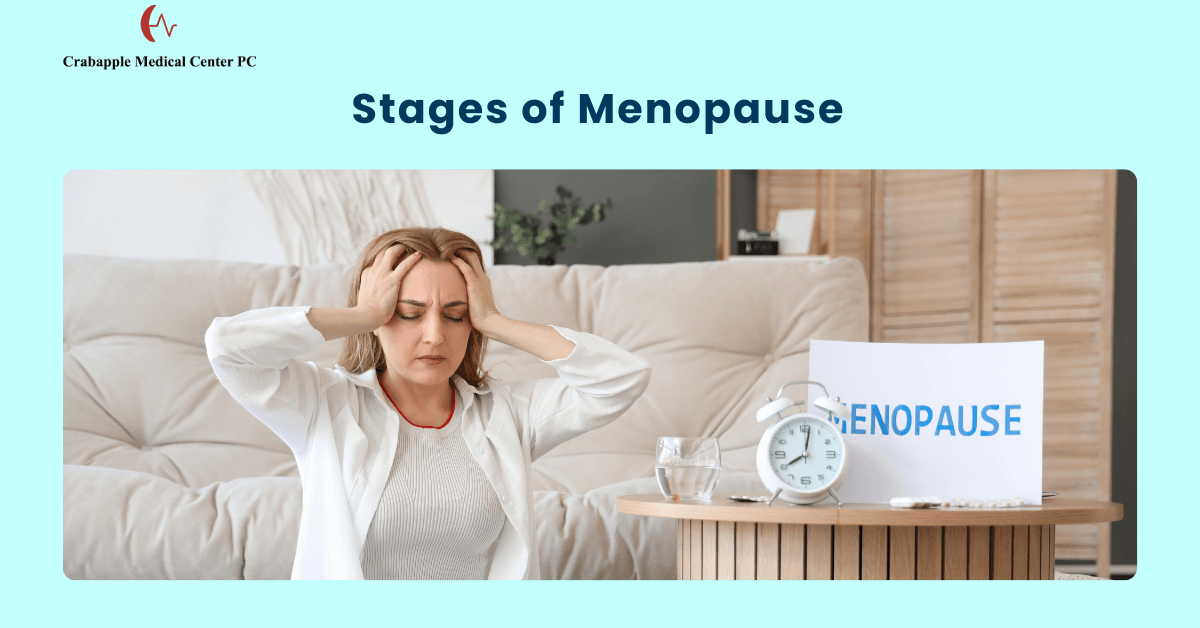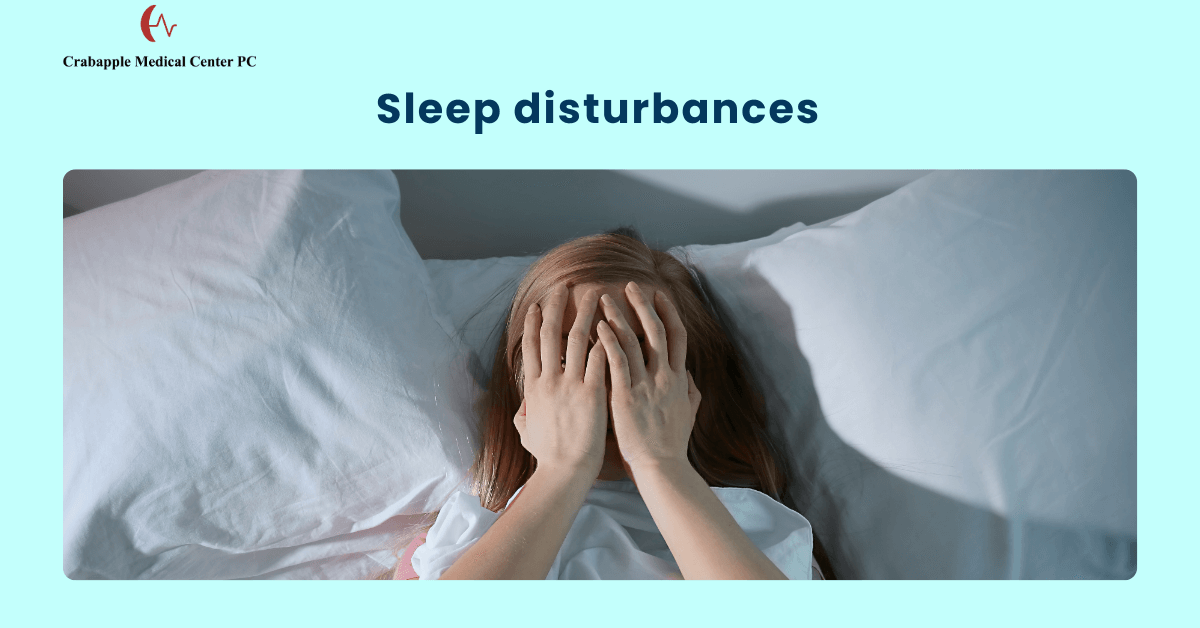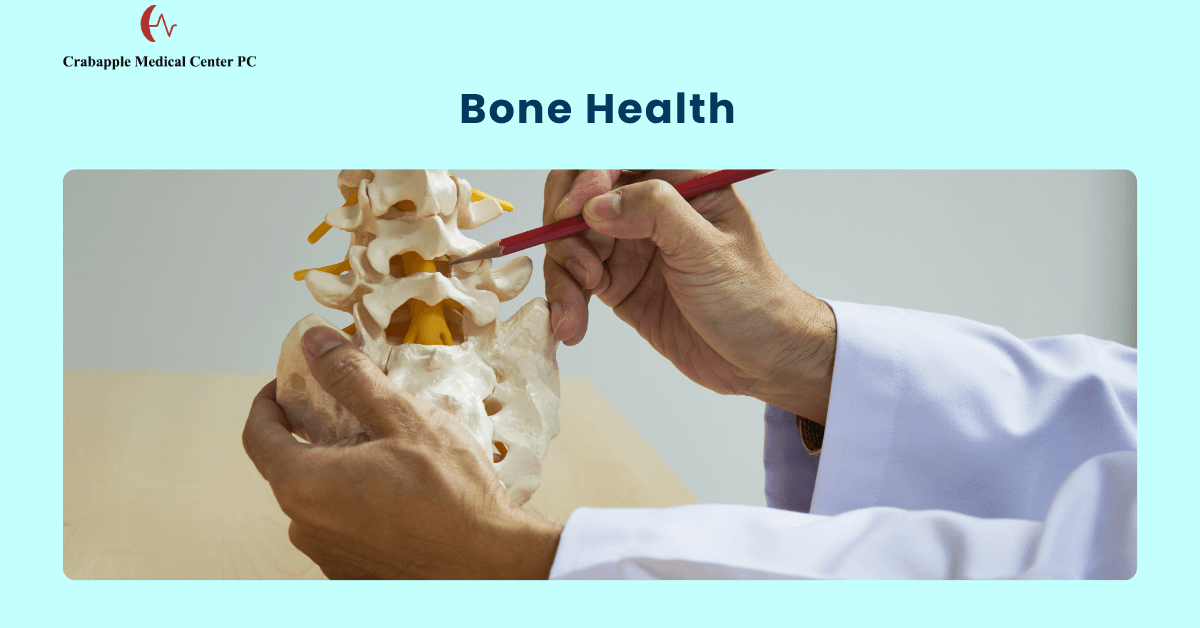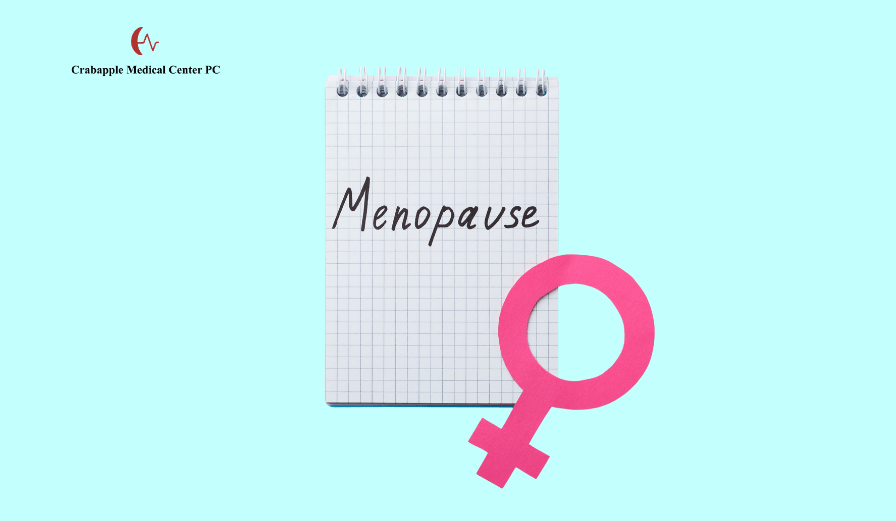Menopause is a natural and universal milestone in every woman’s life, marking the end of menstrual cycles and fertility. Yet for many, this transition can feel confusing, unpredictable, and even isolating.
Hormonal changes may trigger hot flashes, night sweats, mood swings, memory lapses, sleep disturbances, weight fluctuations, and shifts in libido — all while women are often at the peak of their careers, caring for aging parents, or supporting children. These overlapping demands can make menopause feel overwhelming and under-discussed.
At Crab Apple Medical Center, we believe no woman should navigate this stage alone or uninformed. Understanding what is happening inside your body can reduce anxiety, improve your health decisions, and help you embrace this new chapter with confidence.
In this blog, we’ll explore what menopause is, its common symptoms, evidence-based treatments, practical lifestyle tips, and the support available to help you navigate this stage with confidence.
What Is Menopause and When Does It Happen?
Menopause marks the end of menstrual cycles and fertility. It’s officially diagnosed after 12 consecutive months without a period, usually between ages 45 and 55. However, it can occur earlier due to genetics, surgery, or medical treatments.

Stages of Menopause
| Stage | Typical Age Range | What Happens |
| Perimenopause | Mid-40s (sometimes earlier) | Menstrual cycles become irregular; hot flashes, mood swings, and other symptoms may begin. |
| Menopause | Average age 51 | Periods stop completely for 12 months; hormone levels stabilize at a lower level. |
| Postmenopause | After menopause | Symptoms may continue for a few years but often improve; long-term health risks (bone, heart) increase. |
Hormonal changes, primarily declining estrogen and progesterone, drive most of the physical and emotional symptoms of menopause.
Symptoms of Menopause
Every woman’s journey through menopause is unique. While some experience only mild changes, others find their daily lives significantly disrupted. Understanding the range of possible symptoms can help you recognize what’s happening in your body and seek support early.
Physical Symptoms
Hot flashes and night sweats:
Sudden sensations of warmth, flushing, and sweating that occur during the day or at night can disrupt work, sleep, and social activities.

Sleep disturbances
Many women find it harder to fall asleep or stay asleep, which can lead to fatigue, irritability, and reduced concentration during the day.
Vaginal dryness and discomfort
Declining estrogen levels often lead to dryness, itching, or pain during intimacy, which can affect relationships and quality of life.
Irregular periods
In perimenopause, menstrual cycles may become shorter or longer, and flow may be heavier or lighter before periods stop completely.
Urinary changes
Increased frequency, urgency, or urinary tract infections can develop as the urinary tract becomes more sensitive to hormone changes.
Weight gain and slowed metabolism
Hormonal shifts and aging can change body composition, often leading to more abdominal fat and a slower metabolism.
Skin, hair, and nail changes
Hair may thin, skin can become drier, and nails more brittle due to reduced estrogen and collagen production.
Bone density loss
As estrogen declines, bones lose calcium faster, increasing the risk of osteoporosis and fractures later in life.
Emotional and Cognitive Symptoms
Mood swings, irritability, anxiety, or low mood
Emotional ups and downs are common and may be compounded by life stresses.
Trouble concentrating or memory lapses (“brain fog”)
Hormone fluctuations can affect cognition, making tasks feel more challenging.
Changes in libido
Some women notice a decrease in sexual desire, while others experience changes in sexual response or satisfaction.
Recognizing these changes early allows you and your healthcare provider to choose appropriate strategies for relief, protect long-term health, and improve quality of life during this transition.
Health Risks After Menopause
Beyond the visible day-to-day symptoms, menopause can also bring subtle but important changes inside the body. These changes may increase the risk for certain health conditions, which is why staying proactive with check-ups, healthy habits, and preventive care is essential for long-term well-being.

Bone Health
Estrogen plays a major role in maintaining strong bones. When its levels drop after menopause, bone breakdown accelerates, leading to a higher risk of osteoporosis and fractures especially in the hips, spine, and wrists. Many women do not realize bone loss is occurring until a fracture happens. Regular bone density scans (DEXA scans) can detect early loss, and steps such as weight-bearing exercise, adequate calcium and vitamin D intake, and prescribed medications can help protect your skeleton and maintain mobility.
Heart Health
Estrogen also helps keep cholesterol and blood vessels healthy. After menopause, levels of LDL (“bad”) cholesterol often rise, blood pressure may increase, and arteries can stiffen, raising the risk of heart disease; the number one cause of death in women. Regular monitoring of blood pressure, cholesterol, and blood sugar, combined with an active lifestyle, a heart-healthy diet, stress reduction, and smoking cessation, can significantly lower this risk.
Metabolic Changes
Hormonal shifts combined with aging can slow metabolism, promote weight gain around the abdomen, and increase insulin resistance. These changes raise the likelihood of developing type 2 diabetes and metabolic syndrome. Balanced eating, regular exercise, maintaining a healthy waist circumference, and routine lab checks are effective strategies to keep your metabolism on track.
Pelvic Floor and Urinary Health
Lower estrogen levels also affect the urinary tract and pelvic floor muscles. Many women notice increased urgency, frequency, leakage, or recurrent urinary tract infections after menopause. These symptoms are common but not inevitable. Pelvic floor exercises, lifestyle adjustments (like limiting bladder irritants), topical estrogen therapies, and medical treatments can restore comfort and confidence.
Get a Complete Women’s Health Checkup
Whether you’re approaching menopause or well into postmenopause, a comprehensive checkup can give you peace of mind. Let our compassionate clinicians guide you every step of the way.
Evidence-Based Treatments for Menopause Symptoms
There is no one-size-fits-all approach to managing menopause. The best plan depends on your unique health profile, personal preferences, and the severity of your symptoms. At Crab Apple Medical Center, we start with a thorough assessment and then recommend one or more of the following options.
Hormone Therapy (HT)
Hormone therapy involves taking medications that replace estrogen and sometimes progesterone to offset the hormonal changes of menopause. It remains the most effective treatment for hot flashes, night sweats, and vaginal dryness. HT can also help protect bones from rapid loss, reducing the risk of osteoporosis and fractures.
Because hormone therapy is not suitable for everyone, our clinicians evaluate your medical history, family history, and individual risk factors before making a recommendation. We monitor you closely, adjust the dosage as needed, and provide ongoing support to ensure benefits outweigh risks.
Non-Hormonal Medications
For women who cannot or prefer not to take hormones, certain prescription drugs can reduce hot flashes and improve sleep:
- Selective serotonin reuptake inhibitors (SSRIs)
- Serotonin norepinephrine reuptake inhibitors (SNRIs)
- Gabapentin
- Clonidine
Vaginal Moisturizers and Local Estrogen
Vaginal dryness and discomfort are very common but often under-discussed. Low-dose vaginal estrogen available as creams, tablets or flexible rings directly treats the affected tissue with minimal absorption into the bloodstream. This local therapy relieves dryness, itching and pain during intercourse, restoring comfort and intimacy.
Non-hormonal lubricants and moisturizers available over the counter can also make a noticeable difference, especially when used regularly.
Complementary and Behavioral Approaches
Many women benefit from a holistic plan that combines medical treatments with lifestyle and behavioral strategies:
Cognitive Behavioral Therapy (CBT)
Evidence-based counselling that can help manage mood changes, anxiety, and sleep problems associated with menopause.
Lifestyle coaching
Guidance on nutrition, exercise, stress management, and healthy habits that improve both symptoms and long-term health.
Herbal or dietary supplements
Some women try soy isoflavones, black cohosh, or other plant-based products. Because supplements can interact with medications or vary in quality, always consult your healthcare provider before starting any new product.
Lifestyle Changes and Self-Care Tips
Adopting healthy habits can reduce symptoms and protect long-term health.
- Nutrition: Eat a balanced diet rich in fruits, vegetables, whole grains, lean protein, and calcium/vitamin D.
- Exercise: Combine weight-bearing, strength training, and flexibility activities.
- Sleep hygiene: Keep your bedroom cool, avoid caffeine late in the day, and develop a calming bedtime routine.
- Stress management: Practice mindfulness, meditation, yoga, or deep breathing.
- Avoid smoking and limit alcohol: Both increase hot flashes and health risks.
- Track your symptoms: Use an app or journal to identify triggers and progress.
Emotional and Social Support
Menopause affects not just the body but also relationships, career, and self-image. Support can make a huge difference.
- Counselling and support groups: Talking with professionals or peers normalizes your experience.
- Education workshops: Learning about changes empowers you to make informed decisions.
- Partner and family involvement: Helping loved ones understand what you’re going through improves relationships.
- Workplace support: Flexible schedules or small adjustments can ease symptoms during work hours.
At Crab Apple Medical Center, we connect women with local and online support networks, making it easier to find the help you need.
How Crab Apple Medical Center Can Help You Navigate Menopause?
- Personalized menopause assessments: We evaluate your symptoms, health risks, and goals to design a treatment plan that fits your life.
- Hormone and non-hormone options: Our clinicians discuss all available therapies and monitor your progress.
- Lifestyle and nutrition coaching: Support for healthy weight, bone strength, and heart health.
- Mental health resources: Referrals to counselling, mindfulness programs, or support groups.
We see menopause as a new chapter in wellness, not an ending.
Practical Tips to Make Menopause Easier
Small changes in your daily routine can make a big difference in how you feel during menopause. Here are some practical ideas you can start right away:
Dress in light layers to manage hot flashes
Choose breathable fabrics like cotton or moisture-wicking blends and wear layers you can easily remove when a hot flash strikes. Carrying a small handheld fan or a cool drink can also help you cool down quickly.
Keep your bedroom cool and invest in breathable bedding
Lowering the thermostat, using a fan, and choosing lightweight, moisture-absorbing sheets can reduce night sweats and improve sleep quality.
Practice relaxation techniques before bedtime to improve sleep
Gentle stretching, meditation, deep breathing, or a warm bath can calm your nervous system and make it easier to fall asleep and stay asleep.
Stay on top of regular health screenings
Mammograms, Pap smears, bone density scans, blood pressure checks, and cholesterol tests become even more important after menopause. Preventive care helps catch problems early and gives you peace of mind.
Seek medical advice for severe or worrying symptoms
If hot flashes, mood changes, or other issues are interfering with your quality of life, talk to a healthcare provider. At Crab Apple Medical Center, we can assess your situation and recommend treatments or lifestyle strategies customized to you.
By making these small adjustments and staying proactive about your health, you can ease the transition through menopause and protect your long-term well-being.
Empowering Women Through Every Stage of Menopause
Menopause is a natural transition, but it doesn’t have to be overwhelming. With knowledge, medical guidance, and support, you can thrive during and after this stage of life. At Crab Apple Medical Center, we’re committed to ensuring every woman has the information, access, and care she needs to make informed decisions about her health. Because prevention is not just about medicine it’s about empowerment.
Book Your Menopause Consultation
Take control of your health today. Our experienced women’s health team at Crab Apple Medical center is ready to create a personalized plan to manage your menopause symptoms and protect your long-term wellness.
Frequently Asked Questions
What are the first signs of menopause?
Many women notice irregular periods, hot flashes, night sweats, mood swings, or sleep changes. These are signs of perimenopause, the transition before menopause.
How can I manage hot flashes naturally?
Wearing light layers, keeping rooms cool, practicing stress-reduction techniques, and limiting caffeine or alcohol can reduce hot flashes. Your healthcare provider can also suggest treatments.
Is hormone therapy safe for menopause symptoms?
dryness, but it’s not right for everyone. A personalized consultation at Crab Apple Medical Center helps determine the safest approach for you.
Do I still need health screenings after menopause?
Yes. Mammograms, Pap smears, bone density scans, blood pressure checks, and cholesterol tests remain important for ongoing prevention and early detection.
How can Crab Apple Medical Center support me through menopause?
Our team offers personalized assessments, hormone and non-hormone therapies, lifestyle coaching, and access to support resources, so you feel empowered during this life stage.

